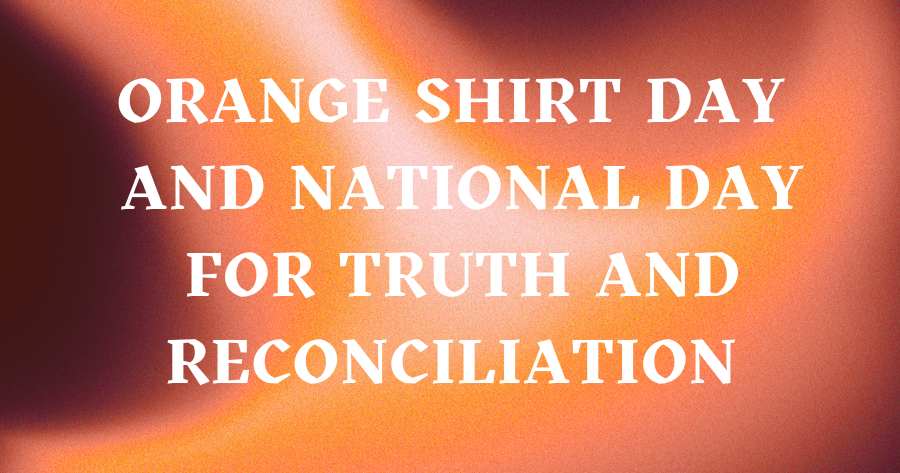Orange Shirt Day and National Day for Truth and Reconciliation Statement
Orange Shirt Day is a legacy of the St. Joseph Mission Residential School Commemoration Project and Reunion events in 2013. Created by former survivors and their families, the events aimed to commemorate the experience of residential schools, to honour the healing of survivors and their families, and to commit to the ongoing process of reconciliation. Since then, Orange Shirt Day is honoured on September 30 as a stark reminder of the ongoing and intergenerational effects of the colonial residential school system as well as an opportunity to renew our commitments to reconciliation with Indigenous kin.
September 30 has also been a day formally honoured as the National Day for Truth and Reconciliation since 2021, and is a day for honoring the survivors of residential school systems and to raise awareness about the intergenerational impacts of residential schools. It is also too often a time of thinkpieces and empty gestures, especially from the government, that end without material commitment to Indigenous sovereignty.
In this current moment, it’s crucial to highlight the dialectic gap between a symbolic recognition of Indigenous sovereignty and brief acknowledgements of the deep injustice perpetrated against Indigenous peoples, and acting with awareness of the nation as an ongoing and violent colonial project against Indigenous peoples. This summer, the introduction of Ontario’s Bill 5: Protect Ontario by Unleashing Our Economy Act has disregarded strong opposition by First Nations Leaders due to removals of environmental protections and threats to Indigenous land sovereignty. Indigenous MPP Sol Mamakwa was removed from the Ontario legislaturefor stating that although “the government said that they respect First Nations, that they respect treaty rights,” “we know the premier is telling untruths to First Nations.”
According to Indigenous Watchdog, as of September 1st, 2025, 40% of the Truth and Reconciliation Commission’s 94 Calls to Action have been stalled or have not started. Despite the government’s promise to bring down the number of communities under boil-water advisories to zero, there are still 33 communities under boil-water advisories. Neskantaga First Nation in northwestern Ontario has been under a boil-water advisory for over three decades, which has been noted as the longest in effect in “Canada”.
As this resource by the Yellowhead Institute aptly asks, “How Do You Like Your Reconciliation?” This month, Room Magazine urges its community to ask: what does it mean to materially support Indigenous communities and survivors, to advocate for justice, to commit to Land Back, to decolonize our understandings of the world, and to centre the sovereignty and self-determination of Indigenous peoples? To follow accounts like @reconciliation_action_group to materially support Indigenous people’s mutual aid outreach campaigns, and keep an eye on and uplift those undergoing legal proceedings in Smithers, British Columbia, where the colonial government will aim to sentence land defenders and Wet’suwet’en law activists Shaylynn Sampson, Sleydo’, and Corey Jocko.
Take Action
Materially support organizations that uplift Indigenous communities, survivors, and their families
- Donate to Indian Residential School Survivors Society (IRSSS) : The IRSSS is a non-profit that provides barrier free, culturally-safe programs and services to support the healing of Residential School Survivors, and Indigenous survivors of generational traumas
- Donate to the Native Women’s Association of Canada (NWAC): Native Women’s Association of Canada (NWAC) is a national Indigenous organization that defends the rights, delivers programming to, and amplifies the perspectives of Indigenous women, girls, Two-Spirit, transgender, and gender-diverse people in Canada.
- Donate to the Moccasin Footprint Society: Moccasin Footprint Society is a Indigenous-led charity that share Indigenous teachings, impacts, ideas, knowledge and systems, and supports grassroots actions.
- Donate to Indigenous Watchdog: Indigenous Watchdog is a non-profit dedicated to monitoring and reporting the progress of reconciliation and issues impacting Indigenous communities
- Donate to the Orange Shirt Society: Orange Shirt Society commemorates, witnesses and honours the healing journeys of Survivors and their families.
- Donate to your local Friendship Centre, via the BC Association of Aboriginal Friendship Centres: Friendship Centres are community hubs that offer culturally safe programs and services, and provide a welcoming space for all members of the community to share knowledge and connect with others.
- Provide material support to Indigenous-led orgnizations through One Day’s Pay, which asks us to give give one day’s pay or what you can afford to an Indigenous-led orgnization
Educational Resources
- Yellowhead Treaty Map ⎯ Familiarize yourself with the Treaty Maps via a digital introduction to Indigenous perspectives on treaties in Canada, from pre-Confederation, Confederation, and “modern” eras
- Land Back: A Yellowhead Institute Red Paper ⎯ How does Canada dispossess Indigenous peoples, and what are Indigenous communities doing to get the land back?
- Education Resources List by The National Centre for Truth and Reconciliation (NCTR) ⎯ of teaching resources designed to support learning about the history and legacy of residential schools in Canada.














